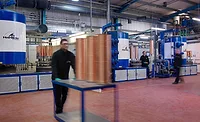Coatings Innovator Receives Funding Award
Exigence Technologies microbial control product a step closer to European market
WINNIPEG, Manitoba – Breakthrough microbial-control technology that was developed at a Canadian university and commercialized by material science/chemistry startup Exigence Technologies has received a major funding award from the European Commission for further product development and commercialization in Europe.
Exigence co-founder and CEO Zach Wolff is pleased about the highly competitive Horizon 2020 SME Instrument Phase II grant award and what it will mean for the UK subsidiary of his company. “Typically, only 2 to 5 percent of EU companies that apply for these funding calls are successful,” he explained. “The amount of the award at 1.045 million euros will provide 70 percent support toward completion of our coating product for industrial-scale food processing surfaces.”
From the inception of the company, its co-founders knew their product had significant potential to be a global player. Establishing a European subsidiary, seeking funding and attracting European partners were the first steps to accessing the European market with its proprietary SymbiCoat™ coating technology. The technology offers a new form of protection to reduce the risk of food contamination from potentially deadly bacteria such as salmonella and listeria. It is designed for use on industrial-scale food processing surfaces. Wolff recently spoke about the technology’s potential at the European Coatings Conference in Nuremberg, Germany.
“The H2020 project will be a European transnational initiative,” said Exigence’s other co-founder and VP of Business Development Sheri Governo. “We’ll have research partners at the Coatings Research Institute in Belgium and Fraunhofer Institute for Process Engineering and Packaging in Germany, as well as business partners in Italy, France, and the UK.” She adds that the project will also support the company’s plans to establish an R&D facility in Lyon, France, which is a city at the center of polymer chemistry and material science.
This is the second Horizon 2020 funding award for Exigence. In 2016, Exigence Technologies UK received a SME Instrument Phase I award to carry out an in-depth feasibility study. “These two awards have significantly enhanced our ability to enter the European market and advance our company globally,” said Governo. “The SymbiCoat Phase II project in particular has garnered attention from North American and European multinationals that want to contribute to the project.”
European Union's research and innovation funding program Horizon 2020 was launched on January 1, 2014. Over seven years, €77 billion is being invested in research and innovation projects to support Europe’s economic competitiveness and extend the frontiers of human knowledge. The EU research budget is focused mainly on improving everyday life in areas like health, the environment, transport, food and energy. Research partnerships with the pharmaceutical, aerospace, automotive and electronics industries also encourage private-sector investment in support of future growth and high-skilled job creation.
Looking for a reprint of this article?
From high-res PDFs to custom plaques, order your copy today!





